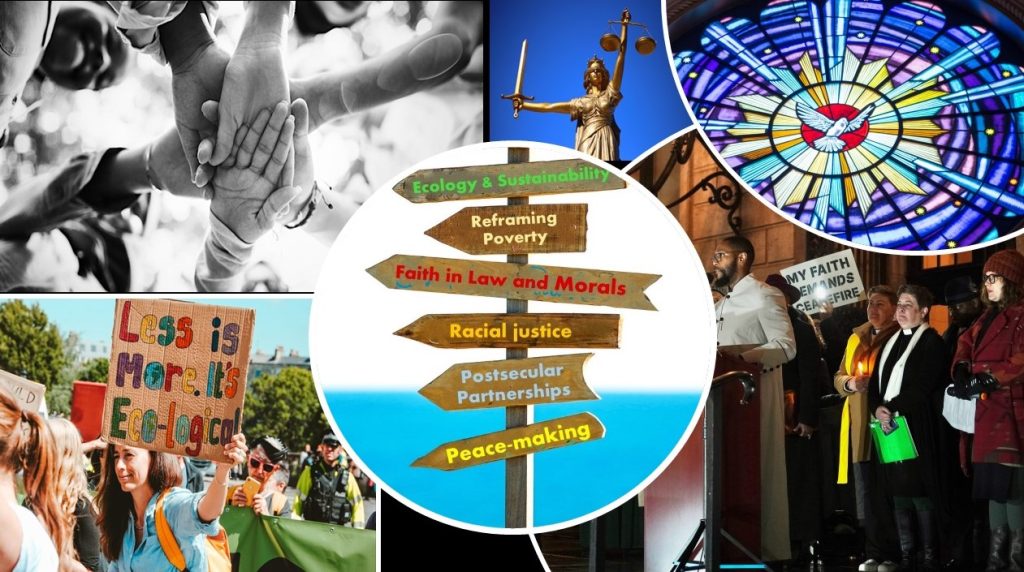Festival of Public Theology
Plurality in Public Square: Activism, Politics and Religion

Our Digital Learning Lead Dr Katya Braginskaia reflects on our recent Festival of Public Theology
The William Temple Festival of Public Theology took place on 21 & 22 of June 2024. Building on earlier traditions of the William Temple College, the festival served as a pilot study to explore opportunities for digital learning and public engagement in theology.
The event brought together around 100 participants, including academics, faith and civil society groups, practitioners, community leaders and people with a strong interest in religion in the public square. Curated by our scholars, researchers and affiliated practitioners, the virtual festival featured eight stimulating taster sessions about religion, radical hope and activism, and a public lecture about the future of faith in the UK.
An emerging theme of the festival has been a re-imagining of public theology, one which is rooted in religious and secular thought, lived experiences of multicultural belonging, activism and critical thinking – echoing William Temple’s ecumenical approach to associational life in which different groups, perspectives and beliefs can collaborate, co-exist and flourish.
The festival programme
Prof Simon Lee set the scene by encouraging participants to step outside the virtual learning environment and imagine they are taking part in the physical summer festival, a concrete space full of exhibition stalls, social mingling and thought-provoking conversations. In his opening lecture he explored the relationship between religion, law and morality by discussing ‘uneasy cases’ which highlighted the potential interplay between religious, secular, humanitarian and legal values in the public square.
Subsequent sessions addressed the role of religion and dialogue in different contexts, including both Anglican and Catholic approaches to conflict and peace (Rev Dr Yazid Said and Dr Maria Power respectively) and provided actionable insights from curating spaces of hope, dialogue and leadership in the Temple tradition (Dr Matthew Barber-Rowell). Other conversations tackled the importance of community engagement and urban transformation (Revd Dr Gill Reeve) and the value of reframing everyday poverty away from depictions of scarcity and depletion towards those stressing resilience and hope (Dr Tina Hearn).
Two interdisciplinary panels engaged with Christian activism and racial justice (convened by Greg Smith in conversation with Rev Dr Israel Olofinjan, Peter Adams and Paul Keeble), and sustainable futures (convened by Lois Guthrie, with contributions from Dr Richard McNeil Douglas, Dr Matthew Barber-Rowell, Prof. Dr Rodney Irwin, Dr Alison Stowell and Mitzi Wyman). The first panel stressed the importance of hearing multiple voices and personal experiences, engaging in collaborative action with intercultural congregations and generating conversations that place issues of racial justice within and alongside reparative justice. The second raised the issue of how theologians and faith communities can help states, businesses and citizens shape their lives and values against a background of climate change and environmental degradation.
The public lecture and discussion
The complexity of engaging with religion and belief in an increasingly contested and fluid public square was explored at length in an evening lecture delivered by Prof James Walters, founding director of the LSE Faith Centre and LSE Religion and Global Society. His lecture examined the evolving role of faith in British society in a global context of religious nationalism and escalating conflict. His talk emphasised a shift from Christian to post-Christian culture and focused on the need for solidarity in the face of these current developments.
Three members of the William Temple Foundation offered their responses to the lecture. Prof Simon Lee, Dr Saiyyidah Zaidi and Revd Dr Ericcson Mapfumo added critical observations, including improving representation for different minority voices in public theology discussions and building a better sense of belonging in British society.
A video of the public lecture and some of the responses from the panel are available below.
Prof James Walters – ‘The Future of Faith in the UK: Theological and Political Perspectives‘
Response from Revd Dr Ericcson Mapfumo
Response from Dr Saiyyidah Zaidi